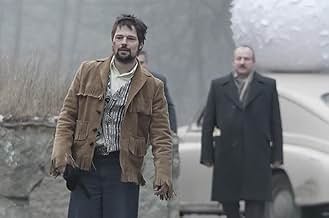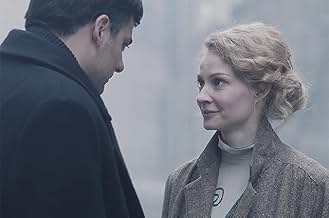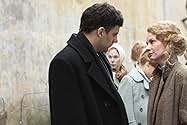VALUTAZIONE IMDb
6,4/10
2299
LA TUA VALUTAZIONE
È il 1971 e in questa puntata vengono narrati i quattro giorni di vita del celebre scrittore Sergei Dovlatov, dove si pone l'eterna questione della cultura russa ed europea: la questione del... Leggi tuttoÈ il 1971 e in questa puntata vengono narrati i quattro giorni di vita del celebre scrittore Sergei Dovlatov, dove si pone l'eterna questione della cultura russa ed europea: la questione della scelta morale.È il 1971 e in questa puntata vengono narrati i quattro giorni di vita del celebre scrittore Sergei Dovlatov, dove si pone l'eterna questione della cultura russa ed europea: la questione della scelta morale.
- Regia
- Sceneggiatura
- Star
- Premi
- 5 vittorie e 11 candidature totali
Danila Kozlovsky
- David
- (as Danila Kozlovskiy)
Tamar Hovhannisyan
- Nora Dovlatova - Sergei Dovlatov mother
- (as Tamara Oganesyan)
Anna Yekaterininskaya
- Deputy director of the plant
- (as Anna Ekaterininskaya)
Sergei Tolstov
- Factory Newspaper Editor
- (as Sergey Tolstov)
Maria Järvenhelmi
- Finnish tourist
- (as Mari Yarvinkhelmi)
Nikolai Shatokhin
- Dovlatov's friend
- (as Nikolay Shatokhin)
Recensioni in evidenza
Maybe not the best. for Comunism. for Dovlatov. for the atmosphere of Soviet Union. the cause - the less courage/art/science of director to move the things out of superficial perspective. sure, for a Eastern public, it works. for the memories about period, for the lectures about it, maybe for the familiarity of Dovlatov and Brodsky writings. but it is not real enough . the good point - the work of Danila Kozlovsky. but this is not a surprise.
Dovlatov is a good biographical film about a famous Russian writer. The majority of biographical films are divided into 2 types: either the film tells the whole life of a person or in detail about some period of life. It is type 2 that I consider preferable, as in 2-2.5 hours of conditional timing it is difficult to lay down a whole life of a person. Dovlatov is just such a film, the action of the film unfolds in just a couple of days 1971. Transfer of an era, life and life of Leningrad of the 1970th years simply 10/10. One of the best films about the period of Brezhnev stagnation of society. Just a good film, in which there are only dialogues and internal conflict of the writer, who alone opposes the state structure.
It's not an easy movie for the viewer. However, it is an addictive cinema. The film is a biography of a writer who did not live to see his work published during his lifetime, so it focuses on impotence, unfulfillment and bitterness. A few days from Dovlatov's life, which we observe on the screen, is therefore a pretext for showing his everyday work - the attempts to publish a text instead of a little ambitious journalistic texts, showing his family and friends, the bohemian environment of Leningrad / St. Petersburg.
The film has a very calm rhythm, it is beautifully photographed and well played. The central figure is the ubiquitous Milan Maric (strikingly similar to Sergei Dovlatov), but although he is present on the screen in almost every scene, he does not dominate history and other characters.
Definitely worth seeing is a film for all those who are interested in showing the creative process on screen or in the reality of life in Soviet Russia.
The film has a very calm rhythm, it is beautifully photographed and well played. The central figure is the ubiquitous Milan Maric (strikingly similar to Sergei Dovlatov), but although he is present on the screen in almost every scene, he does not dominate history and other characters.
Definitely worth seeing is a film for all those who are interested in showing the creative process on screen or in the reality of life in Soviet Russia.
In Soviet times, no one needed talent. Mediocrity ruled the ball, with talented people suppressed, gifted ones even harder - having been afraid of, like a primeval creature is scared and therefore responds aggressively to anything inexplicable. Those talented, having no way of expression, finding no audience, reading audience first of all, would fall into nothingness unless fled abroad or drowned in vodka. This was consistent and gave no chances to artists in developing anything worth reading. But the talent was nonetheless stronger and many infiltrated the history of literature. What Soviet leaders promulgated was easily captured locally, in chief editor's offices, writers' union, even by sellers of forbidden books trembling for their lives and freedom. Total ignorance, straightforwardness, and ultimate desire to crush any individuality made its way to exterminating any roots of artistic calling that has been so strong in the Russian literature before Soviets. That's when the genocide started whose fruits we have along, with the post-Soviet ravenous lust for money having superimposed and inflicted the last strike.
Across the ocean, the world saw beatniks to be the last whose nervous, preagonic howl loomed over the world of big literature, eventually resulting in poor language and rhetoric of late post-modernism with its too much relying on commercialization and losing the essence. What we have now is the outcome of how polar types of societies evolved to squeeze profound art from both sides leaving no place for genius looking for an exit of its artistic power. These days, there is no room to even write a word unless it brings profits to the publisher.
Both Soviet masses and elites were not ready to new trends having no desire to read about trifles rather than something big. Leaving general all-humanity topics for small things was a border between modernism and post-modernism and was for sure better perceived in developed countries rather than those built by narrow thinking of power-holding minorities. Brodsky finally left for the US to be honored a Noble prize, which may be argued about as a politically motivated act, but no one doubted his talents except for those who were afraid that his literary actions may rock the boat of stable way to a better future (which we may very well observe now as well, huh). Whether they did understand that their work is used for political games in this new world, that we don't know, but what we got in the end is a collapse of literature as we, or previous generations, knew it. Through years of struggle, true art has lost its positions and we'll never see it as before again, with the last man of letters having perished at the turn of the century.
As for Dovlatov, Ernst Neschastny once wrote: "He was drinking as hell, drowning himself in alcohol, as generations of Russian men before him - dark Russian alcoholism with the only purpose of slowly killing themselves, reaching the end they were seeking so much, trying to elude the reality they couldn't fix or live in." This is what we don't see in the film, but what we should know. Being unacknowledged throughout his life and finding glory only after his death, Dovlatov remains an image of how the system mutilates fates and lives. Those who he called "low and pathetic people" were the one responsible for their country and its future that we have now. They are to be blamed for narrow-mindedness, vanity, stupidity, thirst for power, and personal ambitions. After all these years, we still see it in federation-level decision makers.
The closing scene is of course the most important one showing how hard it is, emotionally, socially, and physically, to overcome the pressures coming both from inside and outside and follow your way. "Don't listen to no one, your books are your business. It's going to be hard but you will find inner power" sounds like parting words to every artist in doubt. And being such, Dovlatov makes a final line concluding his existence and, perhaps, alluding, in part, to any human's life: "Still we exist, always drinking, in worn out shoes, poor, and sometimes talented. We still exist. We are and we will be. The only way not to lose yourself is to go through that thorny way of hopes, disappointments, and losses. "
10gokselll
What a good movie!!!
In this movie audience witnesses a week of Russian author Dovlatov's life. Panoramic view of those seven days shows interesting details of everyday lives of intellectuals and artists in the late period of USSR.
Within a plain but masterfully designed visual composition, with no agitative langue, the movie presents satirical sub-texts on pressure of state-bureaucratic principles on artistic production, degeneration of USSR administrative regime and confliction of factual-economical position of artist in life and existential and inherent artistic motivation etc...
Critics on state-art relation in this movie not only satire historical conditions in USSR but also compose a general and actual critical sense on relevant matters indicating negative picture of the ideal conditions.
Watching "Dovlatov" is a great cinematic pleasure, a great experience!
In this movie audience witnesses a week of Russian author Dovlatov's life. Panoramic view of those seven days shows interesting details of everyday lives of intellectuals and artists in the late period of USSR.
Within a plain but masterfully designed visual composition, with no agitative langue, the movie presents satirical sub-texts on pressure of state-bureaucratic principles on artistic production, degeneration of USSR administrative regime and confliction of factual-economical position of artist in life and existential and inherent artistic motivation etc...
Critics on state-art relation in this movie not only satire historical conditions in USSR but also compose a general and actual critical sense on relevant matters indicating negative picture of the ideal conditions.
Watching "Dovlatov" is a great cinematic pleasure, a great experience!
Lo sapevi?
- ConnessioniFeatures Romantyczni (1970)
I più visti
Accedi per valutare e creare un elenco di titoli salvati per ottenere consigli personalizzati
- How long is Dovlatov?Powered by Alexa
Dettagli
- Data di uscita
- Paesi di origine
- Siti ufficiali
- Lingue
- Celebre anche come
- Dovlatov
- Luoghi delle riprese
- Aziende produttrici
- Vedi altri crediti dell’azienda su IMDbPro
Botteghino
- Lordo in tutto il mondo
- 2.187.653 USD
- Tempo di esecuzione
- 2h 6min(126 min)
Contribuisci a questa pagina
Suggerisci una modifica o aggiungi i contenuti mancanti

![Guarda Trailer [OVS]](https://m.media-amazon.com/images/M/MV5BZjQ0ODcwYTMtZmU2OC00ZDFlLTkyZTgtY2Y0NDFjMjJmNmZlXkEyXkFqcGdeQXRyYW5zY29kZS13b3JrZmxvdw@@._V1_QL75_UX500_CR0)






























